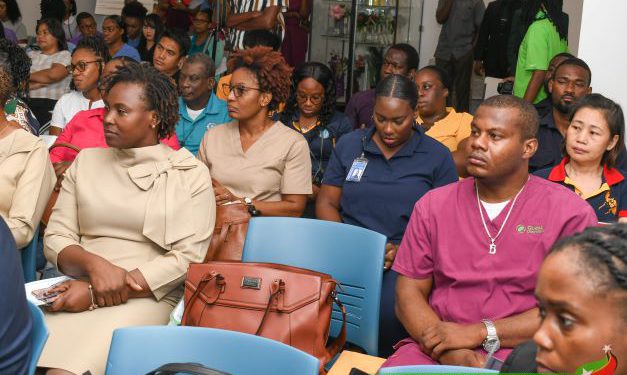BASSETERRE, St. Kitts, November 04, 2022 (SKNIS) – Approximately 250 healthcare professionals in St. Kitts and Nevis, which includes 50 medical doctors, are engaged in a three-day training course that will equip them with the necessary life support skills and knowledge to provide care to patients in a wide variety of in-facility and pre-hospital settings.
The Basic to Advanced Life Support Course, conducted by CPR Solutions, will see the healthcare professionals trained in Advanced Cardiac Life Support (ACLS), Basic Life Support (BLS) and Pediatric Advanced Life Support (PALS). CPR Solutions is the national training center for the American Heart Association.
During an opening ceremony for the training course on Friday, November 04, 2022, at the Ross University School of Veterinary Medicine, Permanent Secretary in the Ministry of Health, Dr. Delores Stapleton Harris said the Ministry is of the view that every medical professional, including doctors and nurses, should possess a valid Basic Life Support Certification.
Permanent Secretary Dr. Harris noted that “These skills are critical in the daily work life of a healthcare provider. These include nurses, doctors, nursing assistants and emergency medical technicians (EMTs). Clearly, there is no debate, none whatsoever, regarding the fact that augmentation of an emergency response service with the requisite trained cadre of healthcare providers is a public health good and proficiency in the basic life support skills is an imperative, certainly not an option as we foster every effort to save lives and promote wellbeing.”
Prime Minister and Minister of Health, the Honourable Dr. Terrance Drew described the Basic to Advanced Life Support Course as a strategic component of his administration’s health agenda.
The Prime Minister said, “The benefits of these life-supporting support training from basic to advance are far-reaching with an undeniable significant positive impact on the healthcare system. The Government and the Ministry of Health, by extension, acknowledge the fact that this type of training is a public good…given the nature of the training and its impact on healthcare outcomes, individuals and communities. We are also aware that although the curricula of health personnel, such as doctors and nurses, may contain some aspects of BLS, it requires continuous review and reinforcement to ensure the skills are retained and can be practised and implemented to appropriately respond to a physiological life-threatening situation when necessary.”
Prime Minister Dr. Drew added that “These training components cannot be fully exhausted in a classroom. This is because although this approach may provide knowledge to the students, without the real-time, hands-on continuous practice of the acquired skills this knowledge is prone to be forgotten. Hence, you have to redo these certification courses every two years. I am therefore extremely pleased that with the support of Ross University School of Veterinary Medicine and the Heart Institute of the Caribbean and the Government, the Ministry of Health is successfully engaging and re-engaging health personnel to equip them with lifesaving skills, CPR and BLS, ACLS and PALS.”
Upon the conclusion of the Basic to Advanced Life Support Course, the Ministry of Health intends to undertake Customer Service Training and other specialization training for the nurses.









